 January is National Thyroid Awareness month, we’ve posted a short article
January is National Thyroid Awareness month, we’ve posted a short article
by Dr. John Sherman, a staff physician, on thyroid health:
Tips on Balancing Thyroid Function
Imagine yourself trudging through life with cement blocks attached to your ankles, and you are miserable from chronic constipation. Add to that the fact that you have been diagnosed with depression or bipolar disease, with the added insult of having been given a prescription for an antidepressant that you likely don’t need. Your cholesterol and blood pressure are high, your memory is getting worse, you keep gaining weight despite a “perfect” diet, you exercise but never sweat, and your hands and feet are always cold.
These are all symptoms of classic hypothyroidism, a poorly functioning thyroid, which often goes untreated because a person’s thyroid lab test falls within a “normal” reference range. Most conventional physicians only test TSH, (thyroid stimulating hormone) to monitor how the thyroid is doing. Many physicians rarely check actual thyroid hormones, T3 and T4, because they are limited by insurance companies’ need to minimize cost. Checking T3 and T4 is the most accurate way of assessing thyroid function. Reverse T3 and thyroid antibodies are two additional important markers. As with T3 and T4, these markers are rarely checked. So one can easily understand why only checking TSH will often lead to an improper evaluation and treatment.
Why is optimal thyroid function so critical? Arguably, the thyroid is the most important gland in the body, since the proper function of all other glands is not possible without it. The thyroid forms in the 24th day of gestation and is the first endocrine gland to develop. The thyroid controls how quickly the body uses energy, makes proteins, and it determines how sensitive the body is to other hormones. Also, when the thyroid is low, the adrenals try to compensate by increasing cortisol, the major “stress” hormone, which can cause anxiety and high blood pressure.
In summary, to treat the thyroid accurately, one must work with a practitioner who is skilled and knowledgeable about the entire body, and who has an understanding of the intricacies of the whole endocrine system. Balancing the thyroid involves more than chasing just TSH levels.
To make a patient appointment to discuss your thyroid function, call 206-812-9988.
